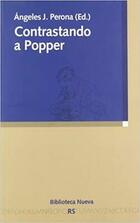Karl Popper (1902-1994), one of the most influential philosophers of the twentieth century, became a relevant philosophical figure as a result of his first epistemological reflections about physical-natural sciences. However, at present, the part of the thought of it that more interest raises, inside and outside the philosophical sphere is related to the considerations of it about the social sciences and the connection of it with issues of practical philosophy. This book is a good sample of it. In it, a legacy is submitted, the popperian, which is undoubtedly already a classic. Now, it is the contrast that a classic deserves: the one that enters critical dialogue with the thought of him from the concerns of contemporary philosophy. This is the point of view that the authors of this volume adopt, among which are prominent representatives of critical rationalism.
Shopping cart
Loading cart
Important notices
|
|
Recordando a André Rouillé: Su legado en la fotografía André Rouillé 1948 - 2025 |
|
|
Libros de filosofía y co. Disponibles en Librería Herder |
|
|
Revista Filosofía & Co. nº 9 Nueva revista de filosofia divulgativa y actualidad |
|
|
"Espacios de la filosofía" - Mauricio Beuchot - Novedad Herder México |
|
|
Revista Filosofía & Co. nº 8 Nueva revista de filosofia divulgativa y actualidad |
Pay safely with:


In the webshop
New
|
|
La profecía en la antigüedad 70531 $900.00 -0.00% $900.00 |
|
|
Simone Weil y la cuestión judía 70530 $470.00 -0.00% $470.00 |
|
|
Medios calientes 70159 $400.00 -0.00% $400.00 |
|
|
El bestiario de Michel Foucault 70404 $749.00 -15.00% $636.65 |
|
|
Cantan los ángeles, rugen los monstruos 69202 $510.00 -0.00% $510.00 |
In the press
Promotions
|
|
Panorama A1.1, Deutsch als Fremdsprache Übungsbuch 36726 $235.00 -35.00% $152.75 |
|
|
Diccionario de términos filológicos 70241 $900.00 -25.00% $675.00 |
|
|
Verbos conjugados $600.00 -25.00% $450.00 |
|
|
Prosa y poesía. Homenaje a Gonzalo Sobeja 70242 $1,755.00 -25.00% $1,316.25 |
|
|
Lingüística española aplicada a la terapia del lenguaje 70239 $300.00 -25.00% $225.00 |









